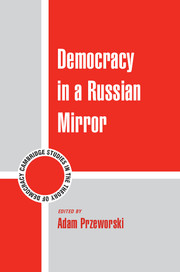Book contents
- Frontmatter
- Contents
- Contributors
- Introduction
- PART I RUSSIA
- PART II DEMOCRACY IN A RUSSIAN MIRROR
- 5 Judging Democracy as Form of Government for Given Territories: Utopia or Apologetics?
- 6 Democracy: Ancient and Modern, Good and Bad
- 7 The Role of Elections in Democracy
- 8 Elections and the Challenge of More Democracy
- 9 Democracy between Elections
- 10 General Settings, Regional and National Factors, and the Concept of Non-Western Democracy
- 11 “Non-Western Democracy” in the West
- PART III PATHS OF POLITICAL CHANGE
- Afterword: Open Issues and Disagreements
- References
- Name Index
- Subject Index
9 - Democracy between Elections
from PART II - DEMOCRACY IN A RUSSIAN MIRROR
Published online by Cambridge University Press: 05 June 2015
- Frontmatter
- Contents
- Contributors
- Introduction
- PART I RUSSIA
- PART II DEMOCRACY IN A RUSSIAN MIRROR
- 5 Judging Democracy as Form of Government for Given Territories: Utopia or Apologetics?
- 6 Democracy: Ancient and Modern, Good and Bad
- 7 The Role of Elections in Democracy
- 8 Elections and the Challenge of More Democracy
- 9 Democracy between Elections
- 10 General Settings, Regional and National Factors, and the Concept of Non-Western Democracy
- 11 “Non-Western Democracy” in the West
- PART III PATHS OF POLITICAL CHANGE
- Afterword: Open Issues and Disagreements
- References
- Name Index
- Subject Index
Summary
INTRODUCTION
Democratic elections empower winners with a time-bound right to govern. It might be for a fixed term, as in the United States, or a fixed term that can be shortened by the prime minister's decision to call an early election or a no-confidence vote in the parliament, as in the United Kingdom. Some democratic constitutions make provision for recall elections, which, in effect, make the government's tenure conditional on the continuing confidence of the electorate. Recall elections date back to ancient Greece, but they are rare among modern democracies and even more rarely are they successfully deployed. Recalls are difficult to engineer even when they are provided for, as was evident when Venezuelan president Hugo Chavez fought off a recall referendum in 2004 and when Wisconsin governor Scott Walker survived a recall election in 2012. As well as the usual advantages of incumbency, recall petitioners must avoid numerous procedural tripwires as they gather large numbers of signatures, and they must do it with scant institutional support. Constitutions that provide for recall seem to have made provision for John Locke's exceptional “long train of abuses” rather than normal democratic politics.
One might speculate as to why governments are not subject to more robust continuing confidence requirements on the part of electorates. This could have to do with considerations of efficiency, with empowering governments to take unpopular measures whose benefits might not be immediately realized, or with other factors. Whatever the reason, elected governments regard themselves as free to govern unencumbered by that constraint, which would make representative government more likely to shadow what a direct democracy would do. Governments in representative democracies must pass final exams; they are not subject to continuous assessment.
This is not to say that democratic politics stops between elections. Shaping the legislation that governments enact, slowing down or curtailing the scope of unwelcome change, fund-raising and jockeying for positions in future elections, and building support with constituents are all ongoing political activities that are punctuated by elections rather than ended by them.
- Type
- Chapter
- Information
- Democracy in a Russian Mirror , pp. 173 - 183Publisher: Cambridge University PressPrint publication year: 2015
- 1
- Cited by

